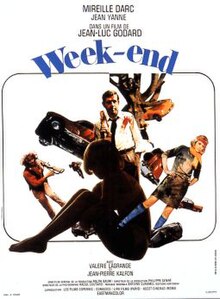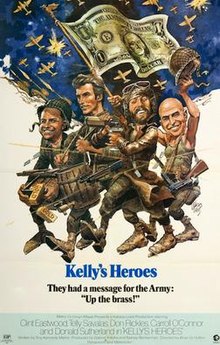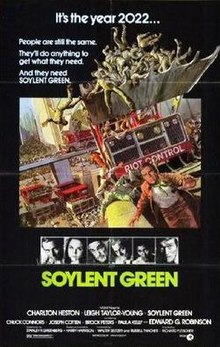Welcome to DU!
The truly grassroots left-of-center political community where regular people, not algorithms, drive the discussions and set the standards.
Join the community:
Create a free account
Support DU (and get rid of ads!):
Become a Star Member
Latest Breaking News
Editorials & Other Articles
General Discussion
The DU Lounge
All Forums
Issue Forums
Culture Forums
Alliance Forums
Region Forums
Support Forums
Help & Search
Classic Films
Related: About this forumTCM Schedule for Saturday Nov. 2: Harlan County, U.S.A., The Manchurian Candidate, Annie Get Your Gun, The Killers

THE DAY AT A GLANCE
MAKING CHANGE - POLITICAL FILMS
Candidate, The (1972)
Harlan County, U.S.A. (1976)
Manchurian Candidate, The (1962)
Weekend (1967)
Grand Illusion (1937) (6:45 am ET)
WEEKEND FEATURES
MGM Parade Show #21 (1955)
(P) The Wolf Dog Ch. 5: Wolf Pack Law (1933)
Popeye: Big Chief Ugh-Amugh-Ugh (1938)
Young Dr. Kildare (1938)
Boy and His Dog, A (1946) (short)
Annie Get Your Gun (1950) (Musical Matinee)
Kelly's Heroes (1970)
Rounders, The (1965)
Killers, The (1946)
- TCM PRIMETIME
TCM SERIES: TWO FOR ONE - SPIKE LEE
Face in the Crowd, A (1957)
Ace in the Hole (1951)
- NOIR ALLEY
Nobody Lives Forever (1946)
- TCM LATE NIGHT: CHARLTON HESTON SCI-FI
Soylent Green (1973)
Omega Man, The (1971)
DETAILED SCHEDULE
10:30 PM The Candidate (1972)

The Candidate is a 1972 American political comedy-drama film starring Robert Redford and Peter Boyle, and directed by Michael Ritchie. The Academy Award–winning screenplay, which examines the various facets and machinations involved in political campaigns, was written by Jeremy Larner, a speechwriter for Senator Eugene J. McCarthy during McCarthy's campaign for the 1968 Democratic presidential nomination.
Dir: Michael Ritchie Cast: Robert Redford, Peter Boyle, Melvyn Douglas
Runtime: 109 mins Genre: Drama Rating: TV-14 CC: Y
Oscar nominations:
SOUND -- Richard Portman, Gene Cantamessa
(*WINNER*) WRITING (Story and Screenplay--based on factual material or material not previously published or produced) -- Jeremy Larner
Trivia: Groucho Marx has an uncredited walk-on cameo in what would be his last screen appearance.
12:30 AM Harlan County, U.S.A. (1976)

Director Barbara Kopple spent a year filming nearly 200 Kentucky coal-mining families and their battle to unionize.
Dir: Barbara Kopple Cast: Norman Yarborough, Houston Elmore, Phil Sparks
Runtime: 103 mins Genre: Documentary Rating: TV-MA CC: Y
Oscar nominations:
(*WINNER*) DOCUMENTARY (Feature) -- Barbara Kopple, Producer
Trivia: When filming began, the film was intended to be about the 1972 campaign by Arnold Miller and Miners For Democracy to unseat UMWA president Tony Boyle, in the aftermath of Joseph Yablonski's murder; however, the Harlan County strike began and caused the filmmakers to change their principal subject, with the campaign and murder becoming secondary subjects.
2:30 AM The Manchurian Candidate (1962)

A Korean War hero doesn't realize he's been programmed to kill by the enemy.
Dir: John Frankenheimer Cast: Frank Sinatra, Laurence Harvey, Janet Leigh
Runtime: 126 mins Genre: Drama Rating: TV-PG CC: Y
Oscar nominations: ACTRESS IN A SUPPORTING ROLE -- Angela Lansbury {"Raymond's Mother"}
FILM EDITING -- Ferris Webster
Trivia: Frank Sinatra broke the little finger of his right hand on the desk in the fight sequence with Henry Silva. Due to on-going filming commitments, he could not rest or bandage his hand properly, causing the injury to heal incorrectly. It caused him chronic discomfort for the rest of his life.
4:45 AM Weekend (1967)

Determined to collect an inheritance from a dying relative, a bourgeois couple travel across the French countryside while civilization crashes and burns around them.
Dir: Jean-Luc Godard Cast: Mireille Darc, Jean Yanne, Jean-Pierre Kalfon
Runtime: 105 mins Genre: Comedy Rating: TV-MA CC: N
Trivia: Lead actress Mireille Darc recounts her first encounter with Godard before shooting: "The meeting takes place, Godard barely speaks to me, looking exasperated behind his big glasses- and yet, yes, he agrees, we're going to work together. On what? He won't tell me. Maybe he doesn't know yet. When I ask him why he is consenting to make this sacrifice, his answer chokes the laughter in my throat: 'Because I don't like you, I don't like the character you play in your films and who you are in life, and because the character in my film must be unpleasant. Oh, I almost forgot: your hair is too blonde; make it light chestnut. And come without makeup; just a little under the eyes, and even so..."
6:45 AM Grand Illusion (1937)

La Grande Illusion (French for "The Grand Illusion"
The title of the film comes from the 1909 book The Great Illusion by British journalist Norman Angell, which argued that war is futile because of the common economic interests of all European nations. The perspective of the film is generously humanistic to its characters of various nationalities.
La Grande Illusion is regarded by critics and film historians as one of the masterpieces of French cinema[2] and among the greatest films ever made. Orson Welles named La Grande Illusion as one of the two movies he would take with him "on the ark". Director and producer Sydney Pollack picked La Grande Illusion as one of his ten favorite films of all time.
In 1958, the film was voted number 5 on the prestigious Brussels 12 list at the 1958 World Expo. In 1995, the Vatican included La Grande Illusion in its list of 45 "great films" under the category of "Art." Empire magazine ranked it #35 in "The 100 Best Films Of World Cinema" in 2010.
Dir: Jean Renoir Cast: Jean Gabin, Pierre Fresnay, Erich Von Stroheim
Runtime: 114 mins Genre: Drama Rating: TV-PG CC: N
Oscar nominations:
OUTSTANDING PRODUCTION -- Realization D'Art Cinematographique
Trivia: Joseph Goebbels made sure that the film's print was one of the first things seized by the Germans when they occupied France. He referred to Jean Renoir as "Cinematic Public Enemy Number 1". For many years it was assumed that the film had been destroyed in an Allied air raid in 1942. However, a German film archivist named Frank Hansel, then a Nazi officer in Paris, had actually smuggled it back to Berlin. Then when the Russians entered Berlin in 1945, the film found its way to an archive in Moscow. When Renoir came to restore his film in the 1960s, he knew nothing of Hansel's acquisition and was working from an old muddy print. Purely by coincidence at the same time, the Russian archive swapped some material with an archive in Toulouse. Included in that exchange was the original negative print. However, because so many prints of the film existed at the time, it would be another 30 years before anyone realised that the version in Toulouse was actually the original negative.
8:45 AM Short: MGM Parade Show #21 (1955)
Wallace Beery and Jackie Cooper perform in a clip from "The Champ," Russ Tamblyn introduces a clip from "The Last Hunt." Hosted by George Murphy.
Dir: null Cast: Wallace Beery, Jackie Cooper, Russ Tamblyn
Runtime: 25 mins Genre: Documentary Rating: TV-G CC: N
9:30 AM Serial: The Wolf Dog - Chapter 5: Wolf Pack Law. (1933)
When a boy's guardian secretly plots to steal his inheritance, only his radio operator friend and wolf-dog companion stand between him and disaster.
Dir: Colbert Clark, Harry L. Fraser Cast: Rin Tin Tin Jr., Frankie Darro, Boots Mallory
Runtime: 20 mins Genre: Adventure Rating: TV-G CC:
10:00 AM Cartoon: Big Chief Ugh-Amugh-Ugh (1933)
Popeye meets a tribe of rough and tough Indians and has an exciting adventure. The big chief takes a liking to Olive, and Popeye, in a laugh-provoking finish, takes on the entire tribe to save his sweetheart from becoming the chief's wife.
Dir: Dave Fleischer, Willard Bowsky Cast: Jack Mercer, Mae Questel, Gus Wickie
Runtime: 6 mins Genre: Animation Rating: TV-PG CC: N
10:08 AM Young Dr. Kildare (1938)

A medical school graduate must choose between a small-town practice and a big-city internship.
Dir: Harold S. Bucquet Cast: Lionel Barrymore, Lew Ayres, Lynne Carver
Runtime: 67 mins Genre: Drama Rating: TV-G CC: Y
Trivia: This was the first film in which Lionel Barrymore played gruff-voiced but soft-hearted Dr. Gillespie. One of MGM studio chief Louis B. Mayer's favorite actors, the irascible Barrymore was cast in this role after he had played Judge Hardy in the first of the studio's Andy Hardy movies, "A Family Affair." Mayer was determined that, as long as he lived, Barrymore would be employed by the studio and after his health confined him to a wheelchair, the part of Gillespie was re-written to accommodate Barrymore's condition. He would go on to play Gillespie in 14 more films.
11:30 AM Short: A Boy and His Dog (1946)
A young boy fights to save a dog from his cruel owner.
Dir: Leroy Prinz Cast: Harry Davenport, Dorothy Adams, Heinie Conklin
Runtime: 20 mins Genre: Short Rating: TV-G CC: Y
12:00 PM Annie Get Your Gun (1950)

Fanciful musical biography of Wild West sharpshooter Annie Oakley.
Dir: George Sidney Cast: Betty Hutton, Howard Keel, Louis Calhern
Runtime: 107 mins Genre: Musical Rating: TV-G CC: Y
Oscar nominations:
ART DIRECTION (Color) -- Art Direction: Cedric Gibbons, Paul Groesse; Set Decoration: Edwin B. Willis, Richard A. Pefferle
CINEMATOGRAPHY (Color) -- Charles Rosher
FILM EDITING -- James E. Newcom
(*WINNER*) MUSIC (Scoring of a Musical Picture) -- Adolph Deutsch, Roger Edens
&list=PLJ8RjvesnvDMCEAyi0ixV4VdB_8Bp_Wm1&index=13
Trivia: Louis Calhern replaced Frank Morgan in the role of Buffalo Bill Cody after Morgan died of a sudden heart attack shortly after filming began. In Buffalo Bill's very first appearance on his horse, Frank Morgan is visible a split second before the shot of Calhern.
2:00 PM Kelly's Heroes (1970)

An American platoon tries to recover buried treasure behind enemy lines.
Dir: Brian G. Hutton Cast: Clint Eastwood, Telly Savalas, Don Rickles
Runtime: 143 mins Genre: War Rating: TV-14 CC: Y
Trivia: Donald Sutherland (Oddball) became seriously ill during filming on-location in Yugoslavia. His wife received a telegram telling her to come immediately but warning her that he would probably be dead before she arrived.
4:30 PM The Rounders (1965)

Two ne'er-do-well cowpokes look for sex and easy money in the modern West.
Dir: Burt Kennedy Cast: Glenn Ford, Henry Fonda, Sue Ane Langdon
Runtime: 85 mins Genre: Comedy Rating: TV-PG CC: Y
Trivia: Vince (Edgar Buchanan) asks Howdy (Henry Fonda) how he came to have such a name as Howdy. "Made it up. Why?" "Marion . . . that was my given name. A man can't ride bucking horses with a handle like that so I changed it." This was a poke at fellow actor John Wayne, who became famous playing cowboys and was born Marion Michael Morrison.
6:00 PM The Killers (1946)

An insurance investigator uncovers a string of crimes when he tries to find a murdered boxer's beneficiary.
Dir: Robert Siodmak Cast: Burt Lancaster, Ava Gardner, Edmond O'Brien
Runtime: 105 mins Genre: Crime Rating: TV-14 CC: Y
Trivia: Film debut of Burt Lancaster.
8:00 PM A Face in the Crowd (1957)

A Face in the Crowd is a 1957 American satirical drama film directed by Elia Kazan and starring Andy Griffith (in his film debut), Patricia Neal and Walter Matthau. The screenplay by Budd Schulberg is based on his short story "Your Arkansas Traveler" from the 1953 collection Some Faces in the Crowd.
The story centers on Larry "Lonesome" Rhodes, a drifter who is discovered by the producer (Neal) of a small-market radio program in rural northeast Arkansas, and who rises to great fame and influence on national television. The character was inspired by Schulberg's acquaintance with Will Rogers Jr. The successes of Arthur Godfrey and Tennessee Ernie Ford were also acknowledged in the screenplay.
The film launched Griffith into stardom, but it received mixed reviews on its release. Subsequent reappraisals have been kinder to the film. In 2008, it was selected for preservation in the United States National Film Registry by the Library of Congress as "culturally, historically, or aesthetically significant"
Dir: Elia Kazan Cast: Andy Griffith, Patricia Neal, Anthony Franciosa
Runtime: 126 mins Genre: Drama Rating: TV-PG CC: Y
This was Patricia Neal's return to the screen after a four-year absence from Hollywood, an absence that was precipitated by a much-publicized affair with Gary Cooper (who was married at the time) and a subsequent nervous breakdown.
10:15 PM Ace in the Hole (1951) (AKA The Big Carnival)

Ace in the Hole, also known as The Big Carnival, is a 1951 American satirical drama film directed, produced, and co-written by Billy Wilder. The film stars Kirk Douglas as a cynical, disgraced reporter who creates a media circus surrounding a man trapped in a cave in rural New Mexico to try to regain a job on a major newspaper. The film co-stars Jan Sterling and features Robert Arthur and Porter Hall.
The film marked a series of firsts for Wilder: it was the first time he was involved in a project as a writer, producer, and director; his first film after parting ways with his long-time writing partner Charles Brackett; and his first film to be a critical and commercial failure, though it has since been reappraised as one of his major works.
Without consulting Wilder, Paramount Pictures executive Y. Frank Freeman changed the title to The Big Carnival just prior to its release. Early television broadcasts retained that title, but when aired by Turner Classic Movies – and when released on DVD by The Criterion Collection in July 2007 – it reverted to Ace in the Hole.
In 2017, the film was selected for preservation in the United States National Film Registry by the Library of Congress as being "culturally, historically, or aesthetically significant".
The film is sometimes referred to as a film noir,though some critics dispute this.
Dir: Billy Wilder Cast: Kirk Douglas, Jan Sterling, Robert Arthur
Runtime: 111 mins Genre: Drama Rating: TV-PG CC: Y
Oscar nominations:
WRITING (Story and Screenplay) -- Billy Wilder, Lesser Samuels, Walter Newman
Trivia: After the film was released, it got bad reviews and lost money. The studio, without Billy Wilder's permission, changed the title to "The Big Carnival" to increase the box office take of the film. It didn't work. On top of that, Wilder's next picture, "Stalag 17 (1953)," was a hit and he expected a share of the picture's profits. Paramount's accountants told him that since this picture lost money, the money it lost would be subtracted from the profits of "Stalag 17".
12:30 AM Nobody Lives Forever (1946)

A con artist falls for the rich widow he's trying to fleece.
Dir: Jean Negulesco Cast: John Garfield, Geraldine Fitzgerald, Walter Brennan
Runtime: 100 mins Genre: Romance Rating: TV-G CC: Y
Trivia: According to TCM's Eddie Muller, screenwriter W.R. Burnett was paid five times for this story. Warner Bros. initially paid him for an original screenplay in 1941. But, per his contract, Burnett took back the rights to his work when the film wasn't made within a specified amount of time. His work was the published in serial form in Collier's magazine in 1943, then published as a novel by Knopf that same year. Warner Bros. then paid him $20,000 ($425,000 in 2024) for the film rights to his novel and paid him yet again to write the screenplay.
2:30 AM Soylent Green (1973)

&pp=ygUVdHJhaWxlciBzb3lsZW50IGdyZWVu
A police officer in the year 2022 uncovers the deadly secret behind a mysterious synthetic food.
Dir: Richard O. Fleischer Cast: Charlton Heston, Leigh Taylor-Young, Edward G. Robinson
Runtime: 87 mins Genre: Horror/Science-Fiction Rating: TV-MA CC: Y
Trivia: During shooting, Edward G. Robinson was almost totally deaf. He could hear people only if they spoke directly into his ear. His dialogue scenes with other people had to be shot several times before he got the rhythm of the dialogue and was able to respond to people as if he could hear them. He could not hear director Richard Fleischer yell "cut" when a scene went wrong, so Robinson would often continue acting out the scene, unaware that shooting had stopped.
4:15 AM The Omega Man (1971)

&pp=ygUVdHJhaWxlciBUaGUgT21lZ2EgTWFu
A scientist who believes he is the only human to survive a worldwide bacteriological war unharmed attempts to save humanity by developing a curative serum from his own blood in this frightening vision of a post-apocalyptic near future.
Dir: Boris Sagal Cast: Charlton Heston, Anthony Zerbe, Rosalind Cash
Runtime: 96 mins Genre: Horror/Science-Fiction Rating: TV-14 CC: Y
Trivia: The 8-track that Neville plays in his car in the opening sequence is clearly Sinatra's "Strangers In The Night" - but presumably due to licensing issues an instrumental version of "A Summer Place" is used on the soundtrack instead.